He usually enters conversation as the answer to a trivia question. Edward Ellis is best known for playing the title character in the 1934 classic The Thin Man.
Scratch that. It’s supposed to be a trick question, this Who played The Thin Man? business. Edward Ellis is the answer you gleefully toss in someone’s face after they incorrectly answer William Powell. Powell, of course, plays Nick Charles, while Ellis is Clyde Wynant, father of the Maureen O’Sullivan character who goes missing and is the subject of the case that drags newlywed Nick back into detecting.
But anyone with enough interest in classic films to have read even just this far has seen Edward Ellis elsewhere as well.
Prior to his appearance in The Thin Man Ellis had played Bomber Wells, the old inmate who emerges as Paul Muni’s sidekick in the 1932 classic I Am a Fugitive From a Chain Gang. Ellis isn’t billed very high in that one but he gets as much camera time as just about anyone not named Muni. Even if he doesn’t stand out for you as Muni’s guide during his initial bout of imprisonment, he is unforgettable dying on the run as Muni makes his final escape.
Another biggie you may have seen Edward Ellis in was as the Sheriff in Fritz Lang’s Fury (1936) starring Spencer Tracy. While he’s not nearly as memorable as his deputy, played by Walter Brennan, Ellis’ Sheriff is one of the more interesting characters of Fury as a man caught up in doing his job: he puts Tracy’s Joe Wilson behind bars and keeps him there, but he’s also the man on the top step fighting to keep the mob from overrunning Wilson’s prison cell. That could have worked out better.
Edward Ellis almost had one more defining role. Frank Capra offered him the role of the President of the Senate in Mr. Smith Goes to Washington (1939), but Ellis turned it down. The part went to former silent and Western star Harry Carey, who charmed us in giving James Stewart’s Jefferson Smith a fair shake and boosted his career in the process. Ellis, who played many a crank in his time, really could have benefited with such a sympathetic role and would certainly be a much better remembered name today had he had this credit to pair with his part from The Thin Man.
But while turning down one of our favorite parts in one of the most popular movies of all time makes Edward Ellis the answer to yet another trivia question, the fact that he turned down this meaty but small role is much less of a surprise if you look at where his career was in 1939. The actor who eventually played the role, Harry Carey, hadn’t appeared in anything important in years. He had been playing sheriffs and detectives as a B-lead and been working in support in bigger though still mostly unremembered films.
But Edward Ellis, then age 69, was in the midst of his greatest run of movie stardom by 1939.
Edward Mayne Ellis was born in Coldwater, Michigan, November 12, 1870, the middle child of Edward C. Ellis, an actor born in Ireland, and Michigan’s own Ruth Augusta Ellis.
The elder Ellis had served the entirety of the Civil War, finding time to marry Ruth in 1864, and would be described in his 1914 obituary by The New York Dramatic Mirror as a “well-known actor, producer, playwright … for many years associated with the foremost managements of the Middle West and South.” He eventually left the theatrical world to work in the advertising department of the Hamlin Wizard Oil Company. Ruth Augusta had predeceased him in 1905.
“My father was an actor, and it is related that at two years of age I escaped from his dressing room, my face gummed up with striped candy and made an entrance in a scene that called for a child,” Ellis told Della MacLeod in a 1914 interview for the New York Press.
But the younger Ellis is typically credited with have made his stage debut at age 7, when at Hooley’s Theater in Chicago he played in Olivia starring Fanny Davenport. Following that he played with the juvenile H.M.S. Pinafore company before taking on child roles with Mr. and Mrs. McKee Rankin’s touring company. Ellis went to school when he was about sixteen—he reports having completed the 7th Grade on a census from later in his life.
“My schooling was rather spasmodic but I rather liked it, after the theatre,” he told MacLeod. “Then I started out to make my living playing baseball in Canada. I’d probably be playing yet if my arm hadn’t gone back on me. Then I followed the line of least resistance and went back on the stage.”
Edward Ellis was neither an only child nor the only member of the Ellis youth to enter the acting profession. His older sister, Edith M. Ellis, had her given profession listed as actress as early as the 1880 census, when she was just 16. Younger sister Bessie Esmond Ellis, born 1877, was also on the stage until she married and retired.
Edith Ellis enjoyed success authoring more than thirty plays with her first hit, Mary Jane’s Pa, playing in 1908, by which time brother Edward was already on Broadway in Genesee of the Hills. Edward did some writing himself as author of the moderately successful Any Night, which played the Princess Theatre in 1913, and later The Great Bradley Mystery (1917) for the screen, which he also starred in.

Ellis, seated, with his deputy Walter Brennan and poor Spencer Tracy, who is just beginning to realize what he faces, in FURY
Despite some acclaim in this field Edward Ellis downplayed his writing skills, thinking of the area as his sister’s domain: “Maybe I might take myself seriously as a playwright if my sister, Edith Ellis, didn’t write plays. Somehow when there is one member of a family doing a thing it rather seems an encroachment to get on that one’s staked territory.”
Ellis had become known on the stage for playing crooks and villains, but as with most typecast actors longed for meatier roles: “I haven’t the feeling that I was divinely appointed to interpret such roles. My work is character work and I long to get back to a part with whiskers.”
He played Blackie Daw in 1910’s Get-Rich-Quick Wallingford; was Spider Hart in 1914’s The Dummy and Rupe Gurney in Crane Wilbur’s 1920 play The Ouija Board. Ellis also racked up his first several screen credits on the East Coast as so many Broadway actors did during the decade. He starred in Apollo Pictures productions for Art Drama, the company which would produce his script, The Great Bradley Mystery.
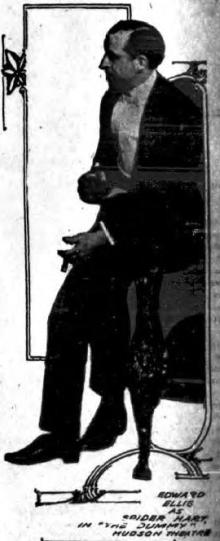 It was also during this period that Ellis married the screen actress Josephine Stevens, whose film credits were few but included appearances in three Roscoe Arbuckle shorts that also featured Buster Keaton. Upon announcing their April 5, 1917 marriage The Moving Picture World referred to Josephine as “a film actress of note.”
It was also during this period that Ellis married the screen actress Josephine Stevens, whose film credits were few but included appearances in three Roscoe Arbuckle shorts that also featured Buster Keaton. Upon announcing their April 5, 1917 marriage The Moving Picture World referred to Josephine as “a film actress of note.”
 This would be Edward Ellis’ only marriage and the two were divorced by the time of the 1930 census which found Josephine already remarried to John Baird with a 2-year-old daughter by him. Also in the house was 12-year-old Bobbie Ellis, Josephine’s
This would be Edward Ellis’ only marriage and the two were divorced by the time of the 1930 census which found Josephine already remarried to John Baird with a 2-year-old daughter by him. Also in the house was 12-year-old Bobbie Ellis, Josephine’s son daughter by Edward. I haven’t yet had any luck in discovering what happened to Bobbie–unfortunately searching the name Robert Ellis brings forth too many leads to follow for a piece of this nature. (See comment HERE for explanation).
Edward Ellis only appeared in that early handful of silent films but remained active on Broadway throughout most of the 1910s and ‘20s. “As a matter of fact,” columnist Wood Soanes wrote in 1939, “Ellis was constantly busy until he accepted a nod from Hollywood in 1932. Since then he has had only small character roles, none of which gave him the opportunities presented by A Man to Remember.”
It was RKO’s A Man to Remember (1938) which would briefly elevate 68-year-old Edward Ellis to movie stardom in the tradition of other elderly stars of the decade from Marie Dressler and May Robson to even Lionel Barrymore. It was Barrymore, in fact, who had played the lead in RKO’s earlier version of A Man to Remember, titled One Man’s Journey, in 1933.
Ellis played Dr. John Abbott in A Man to Remember, and remember him we must because Dr. Abbott is dead when the film begins. A trio of Westport’s most respected citizens, played by Granville Bates, Harlan Briggs and Frank M. Thomas, sit in an attorney’s office (Charles Halton) as the late Doctor’s strongbox filled with bills and receipts is sifted through and his life is played back in flashback.
The life and career we reflect upon is that of the old time country physician. Doc Abbott arrives in town with his son, Dick, initially played by Dickie Jones who grows into Lee Bowman, and soon has himself a daughter courtesy of an angry farmer (fellow Fugitive convict John Wray) who orphans the unwanted girl to Abbott’s doorstep. Carole Leete plays young Jean before growing up to become Anne Shirley.
From there we watch Ellis’ kindly yet worldly Abbott serve Westport and raise the children. Dick becomes a more traditional modern doctor who forsakes his father’s country practice in favor of making money while Jean remains behind eventually aiding her stepfather in his greatest fight against a polio epidemic in Westport. Tucked in between Ellis’ strong performance is what comes off as an uncomfortable romance between John and his stepsister.
Adapted by Dalton Trumbo from Katharine Havilland-Taylor’s story Failure and the first film to be directed by Garson Kanin, A Man to Remember was a huge popular and critical success. Frank M. Nugent of the New York Times wrote that it “is a distinguished and unusual film, for the qualities which distinguish it are merely such elements as simplicity, honesty, dignity and human warmth.” Nugent added that “Mr. Ellis’s portrayal is splendid.”

This 1940 Tobacco Card pictures a scene from A MAN TO REMEMBER with Anne Shirley in Lee Bowman’s clutches with Ellis’ approval.
At the tail end of his career RKO elevated Ellis to stardom off the success of A Man to Remember, but bad luck would prevent Dr. Abbott from becoming Edward Ellis’ legacy: the film was lost until a Dutch copy was found and restored by the Netherlands Filmmuseum in 2000. It played on Turner Classic Movies for the first time in 2007, the first time the film had been seen in nearly seventy years.
Ellis scored again as Andrew Jackson in support of Richard Dix’s Sam Houston in Republic’s Man of Conquest and yet again reunited with Anne Shirley of A Man to Remember in RKO’s Career, which saw him as a hardware store owner pitted opposite Shirley’s screen father, Samuel S. Hinds.
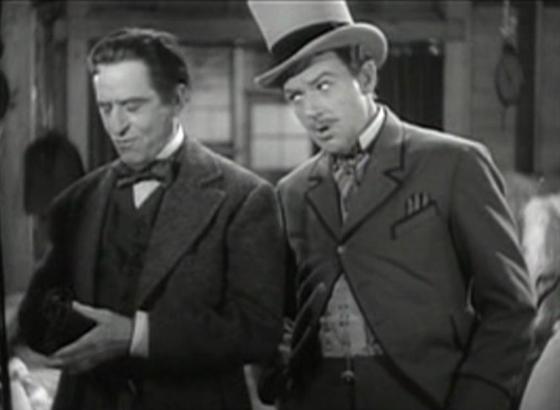
69-year-old Edward Ellis, left, made up young for THREE SONS (1939) as he had been for A MAN TO REMEMBER. William Gargan, right, is Ellis’ brother, Thane, in this remake of 1933’s SWEEPINGS. Gargan had played one of the sons in the original.
Lightning didn’t strike twice when Ellis was cast in another Lionel Barrymore remake, 1939’s Three Sons, which had been more successful with Barrymore in 1933 as Sweepings, the title of the Lester Cohen novel both stories were based upon. Ellis had one more shot at a leading role with Republic in Main Street Lawyer, but by this time not only was the-69 year-old actor’s brief flush of stardom waning, his career was winding down due to ill health.
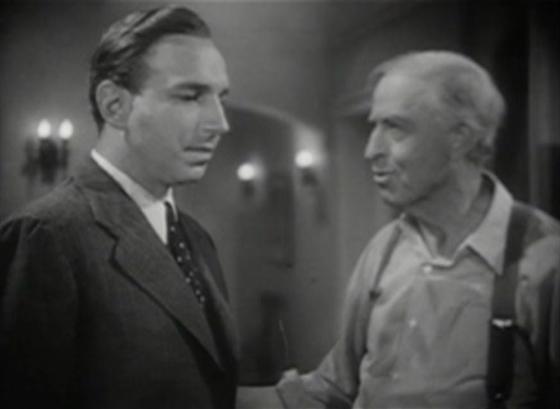
Ellis was back to supporting roles for 1941’s STEEL AGAINST THE SKY. He’s pictured here with Lloyd Nolan, one of three sons, an unlikely trio completed by Craig Stevens and Edward Brophy. A pretty lousy movie with an intriguing cast that also included Gene Lockhart, Alexis Smith and a bit role as a drunk for Jackie Gleason.
Ellis was reportedly planning to retire to his desert ranch near Palm Springs after completing Warner Brothers’ Dangerously They Live, but he didn’t appear in that film at all. Ellis had been ill during this period and wound up wrapping up his film career for MGM in a supporting role in 1942’s The Omaha Trail.
Edward Ellis died July 26, 1952, age 81.
“I went through every hardship and privation possible to imagine. I know what it is to sleep in town halls and in no halls at all—to go hungry until one forgets what food tastes like.” — Edward Ellis, already looking back in 1914.
Sources
Articles
- Coons, Robbin. “Hollywood Sights and Sounds.” 2 Oct 1942: 4. GoogleNews. Web. 11 Nov 2012.
- ”Edward Ellis and Josephine Stevens.” Moving Picture World 32 (1917): 600. Media History Digital Libray. Web. 11 Nov 2012.
- Edward C. Ellis. New York Dramatic Mirror 8 Jul 1914: 15. Old Fulton NY Postcards. Web. 11 Nov 2012.
- MacLeod, Della. “Edward Ellis Says the Ability to Play Crook Parts, Like Beauty, Is Only Skin Deep.” New York Press 12 Jul 1914: 5.Old Fulton NY Postcards. Web. 11 Nov 2012.
- Nugent, Frank S. “A Man to Remember.” New York Times 7 Nov 1938: 23.
- Soanes, Wood. ”Movie Called ‘Hit and Run’ To Be Built Around Career of Famous Connie Mack.” Oakland Tribune 31 Jan 1939: 10. NewspaperArchive. Web. 11 Nov 2012.
- ”This Means War!” Oakland Tribune 2 Nov 1941: 139. NewspaperArchive. Web. 11 Nov 2012.

Edward Ellis, movie star, is the focal point of this ad for the 1938 hit A MAN TO REMEMBER (Burlington Daily Times, October 21, 1939, page 2).
Archives
- “Illinois, Cook County Deaths, 1878-1922,” index and images, FamilySearch (https://familysearch.org/pal:/MM9.1.1/N7XK-C4H : accessed 13 Nov 2012), Ruth A. Ellis, 27 Jan 1905.
- “Michigan, Births, 1867-1902,” index and images, FamilySearch (https://familysearch.org/pal:/MM9.1.1/NQCS-TSQ : accessed 12 Nov 2012), Edward C. Ellis, 12 Nov 1870.
- “United States Census, 1880,” index and images, FamilySearch (https://familysearch.org/pal:/MM9.1.1/MXNY-RWV : accessed 12 Nov 2012), Edith M. Ellis in household of Edward C. Ellis, Chicago, Cook, Illinois, United States; citing sheet 459C, family 2, NARA microfilm publication T9-0194.
- “United States Census, 1900,” index and images, FamilySearch (https://familysearch.org/pal:/MM9.1.1/MS7H-4M7 : accessed 13 Nov 2012), Ruth A Ellis in household of Edward M Wilder, ED 1084 Precinct 11 Hyde Park Township Chicago city Ward 34, Cook, Illinois, United States; citing sheet 10B, family 227, NARA microfilm publication T623, FHL microfilm 1240289.
- “United States Census, 1930,” index and images, FamilySearch (https://familysearch.org/pal:/MM9.1.1/X4PB-4L9 : accessed 12 Nov 2012), Bobbie Ellis in household of John Baird, Queens (Districts 0751-1000), Queens, New York; citing enumeration district (ED) 0876, sheet 3B, family 27, NARA microfilm publication T626, roll 1593.
- “United States Census, 1940,” index and images, FamilySearch (https://familysearch.org/pal:/MM9.1.1/K97H-4F5 : accessed 12 Nov 2012), Edward Ellis, Tract 382, Beverly Hills, Beverly Hills Judicial Township, Los Angeles, California, United States; citing enumeration district (ED) 19-43, sheet 5B, family 151, NARA digital publication T627, roll 221.
[phpbaysidebar title=”eBay Shopping” keywords=”Edward Ellis” num=”5″ siteid=”1″ category=”45100″ sort=”EndTimeSoonest” minprice=”15″ maxprice=”699″ id=”2″]

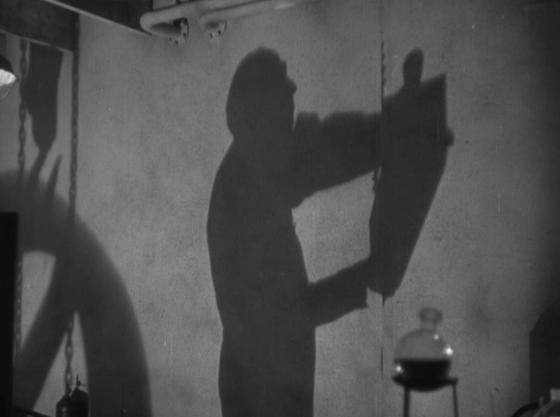





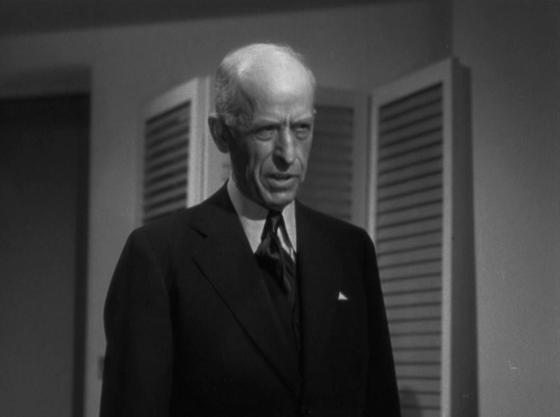
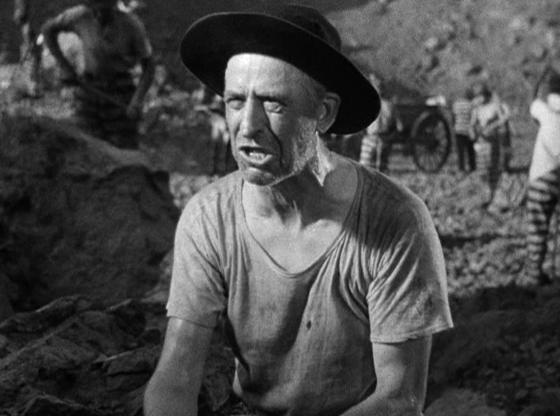







Great post! i knew nothing about Edward Ellis – thanks for a fascinating bio.
Thanks, R.A. It took me a long time to connect his “Thin Man” and “Fugitive” parts as being played by the same guy, but once I saw “A Man to Remember” the bigger picture formed and I wanted more.
Correction on your story. Bobbie was not a son. She was his and Josephine’s daughter and my husband’s Aunt.
Given the feminine spelling and my difficulty following up, that makes total sense! Thanks so much for taking time to let me know!
I’ve given it a bit of a sloppy update for the moment (striking through original text, adding new info w/link to your comment), but will clean it up better some time in the future.
Thanks again, and I hope you enjoyed the post. I’m a big fan of Edward Ellis’ work!